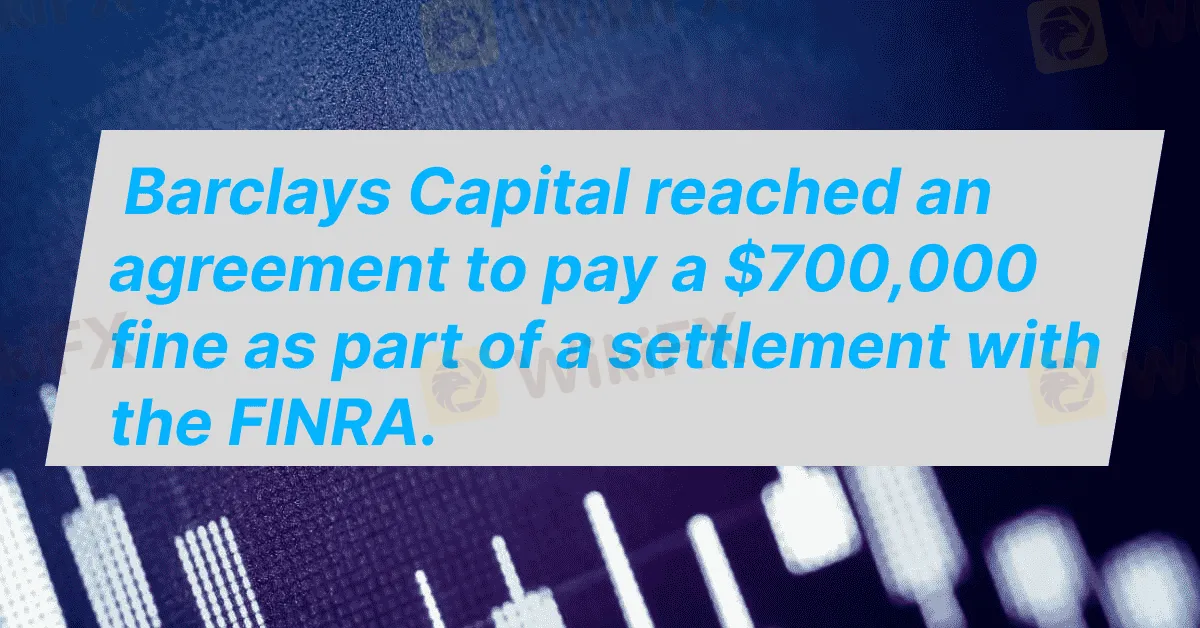简体中文
繁體中文
English
Pусский
日本語
ภาษาไทย
Tiếng Việt
Bahasa Indonesia
Español
हिन्दी
Filippiiniläinen
Français
Deutsch
Português
Türkçe
한국어
العربية
Barclays Capital reached an agreement to pay a $700,000 fine as part of a settlement with the FINRA.
Abstract:The settlement stems from alleged violations of FINRA rules regarding conflicts of interest involving research analysts. According to these rules, firms must have policies in place to prevent analysts from trading securities in a manner inconsistent with their published ratings, and must disclose any financial interests analysts may have in covered companies.

The settlement stems from alleged violations of FINRA rules regarding conflicts of interest involving research analysts. According to these rules, firms must have policies in place to prevent analysts from trading securities in a manner inconsistent with their published ratings, and must disclose any financial interests analysts may have in covered companies.
Between January 2016 and August 2019, Barclays purportedly failed to establish and maintain a supervisory system, including written procedures, to comply with these rules. Specifically, the firm neglected to adequately monitor its research analysts' managed brokerage accounts for compliance with trading restrictions or to ascertain if they held securities in covered companies. This failure resulted in the non-disclosure of analyst-held securities in 99 equity research reports, as well as the oversight of three instances where an analyst's external account manager traded against their published recommendations.
These actions led to violations of several FINRA rules, including 2241(b)(2)(J), 224l(c)(4)(A), 3110(a) and (b)(1), and 2010. Furthermore, Barclays' written supervisory procedures lacked a process to review securities transactions in analysts' external accounts for potential securities law violations, such as market manipulation and insider trading, thus contravening FINRA Rules 3110(d) and 2010.
Additionally, from April 2021 to March 2022, Barclays allegedly failed to gather data for certain clients of its affiliates to determine if disclosure of conflicts of interest was necessary in research reports. Consequently, the firm omitted disclosures in at least 803 reports covering 22 issuers, indicating affiliations and compensation received from issuers within the preceding 12 months, in violation of FINRA Rules 2241(c)(4)(D) and 2010.

Disclaimer:
The views in this article only represent the author's personal views, and do not constitute investment advice on this platform. This platform does not guarantee the accuracy, completeness and timeliness of the information in the article, and will not be liable for any loss caused by the use of or reliance on the information in the article.
Read more

Never Heard of Dynasty Trade? Here's Why You Should Be Worried
Have you heard this name before? No , it’s time you do because staying unaware could cost you. This platform is currently active in the forex trading and has been linked to several suspicious activities. Even if you’ve never dealt with it directly, there’s a chance it could reach out to you through ads, calls, messages, or social media. That’s why it’s important to know the red flags in advance.

WEEKLY SCAM BROKERS LIST IS OUT! Check it now
If you missed this week's fraud brokers list and are finding it difficult to track them one by one — don’t worry! We’ve brought together all the scam brokers you need to avoid, all in one place. Check this list now to stay alert and protect yourself from fraudulent brokers.

Catch the Latest Update on BotBro & Lavish Chaudhary
BotBro, an AI-based trading platform, became popular in India in 2024—but for negative reasons. Its founder, Lavish Chaudhary, who gained a huge following by promoting it heavily on social media. Since then, he has become well-known, but for many controversies. Let’s know the latest update about Botbro & Lavish Chaudhary.

Trading Other People’s Money | What Prop Firms Don’t Tell You
Proprietary (prop) trading firms have become increasingly popular. They give traders the chance to trade with larger amounts of money without risking their own savings. For many, this sounds like the perfect opportunity to grow faster and earn more. But while the benefits are appealing, there are also risks and hidden rules that traders must understand before joining a prop firm.
WikiFX Broker
Latest News
Is Your Forex Strategy Failing? Here’s When to Change
FSMA Warns That Some Firms Operate as Pyramid Schemes
Apex Trader Funding is an Unregulated Firm | You Must Know the Risks
Sigma-One Capital Scam? Investors Say They Can’t Withdraw Funds
Federal Reserve likely to hold interest rates steady despite pressure from Trump. Here's what that means for your money
WEEKLY SCAM BROKERS LIST IS OUT! Check it now
Intel drops 9% as chipmaker's foundry business axes projects, struggles to find customers
Palantir joins list of 20 most valuable U.S. companies, with stock more than doubling in 2025
Textiles to whisky: U.K.–India 'historic' deal is set to boost bilateral trade by over $34 billion a year
Thailand-Cambodia border clashes: Cambodia's economy has more to lose, analysts say
Currency Calculator


